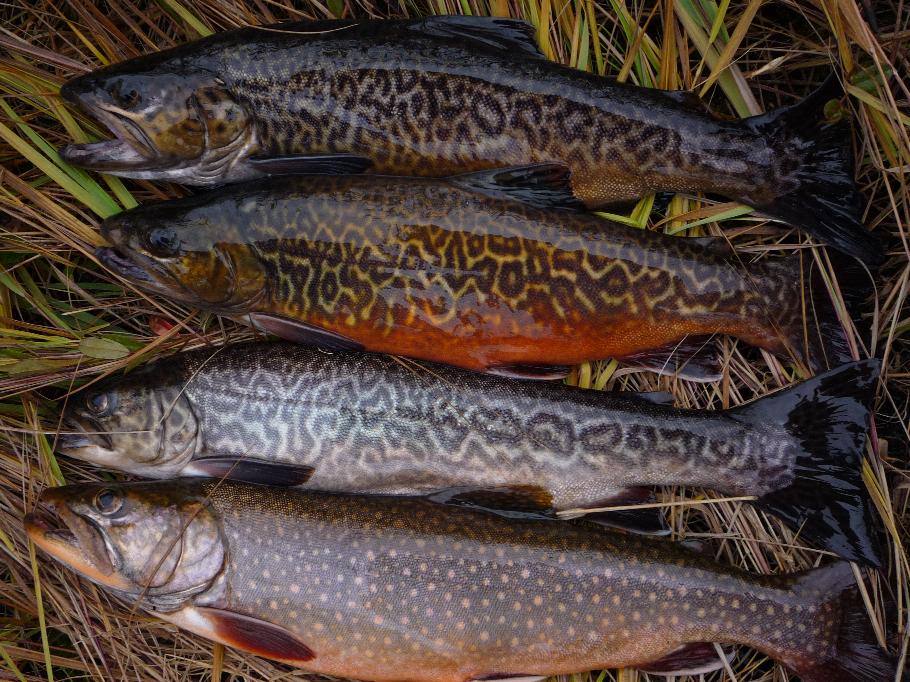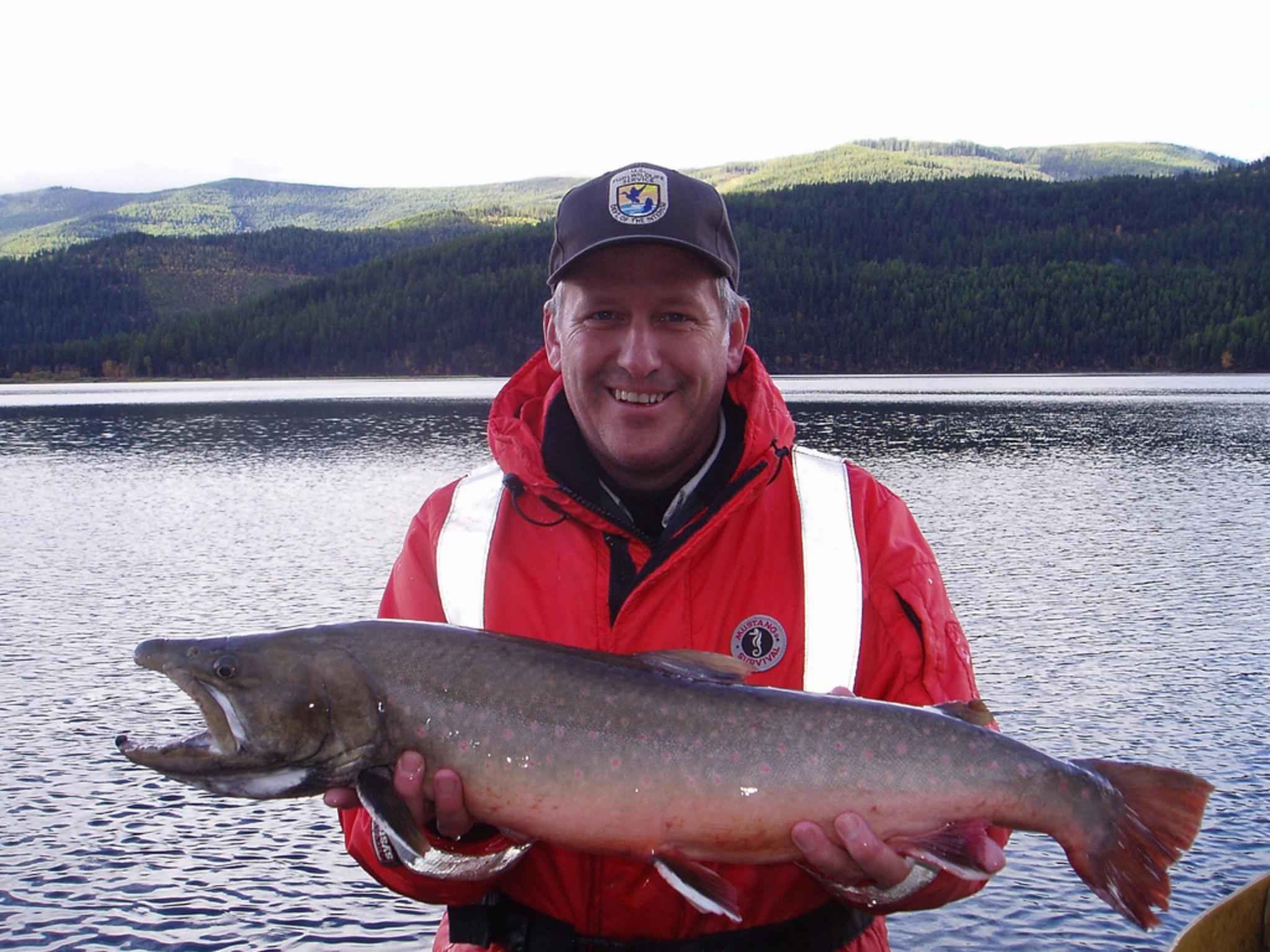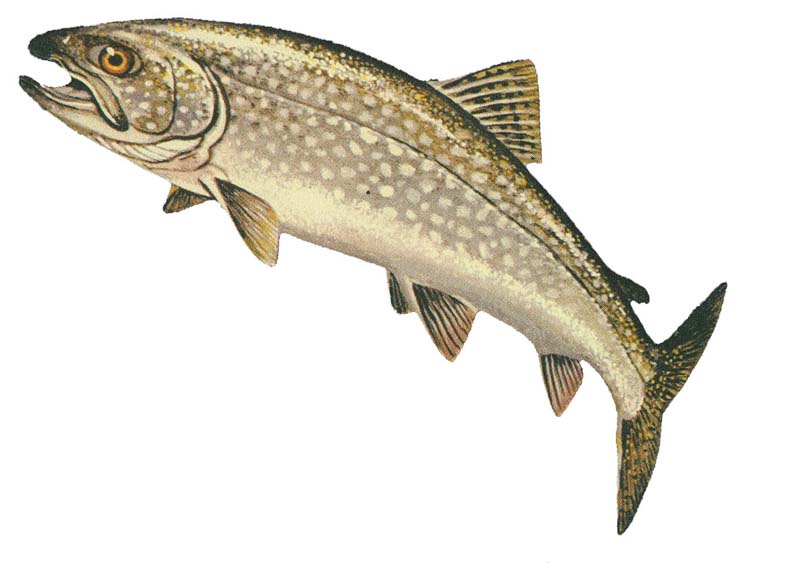|
Brook Trout
The brook trout (''Salvelinus fontinalis'') is a species of freshwater fish in the char genus ''Salvelinus'' of the salmon family Salmonidae. It is native to Eastern North America in the United States and Canada, but has been introduced elsewhere in North America, as well as to Iceland, Europe, and Asia. In parts of its range, it is also known as the eastern brook trout, speckled trout, brook charr, squaretail, brookie or mud trout, among others. A potamodromous population in Lake Superior, as well as an anadromous population in Maine, is known as coaster trout or, simply, as coasters. The brook trout is the state fish of nine U.S. states: Michigan, New Hampshire, New Jersey, New York, North Carolina, Pennsylvania, Vermont, Virginia, and West Virginia, and the Provincial Fish of Nova Scotia in Canada. Systematics and taxonomy The brook trout was first scientifically described as ''Salmo fontinalis'' by the naturalist Samuel Latham Mitchill in 1814. The specific epi ... [...More Info...] [...Related Items...] OR: [Wikipedia] [Google] [Baidu] |
Samuel Latham Mitchill
Samuel Latham Mitchill (August 20, 1764September 7, 1831) was an American physician, naturalist, and politician who lived in Plandome, New York. Early life Samuel Mitchill was born in Hempstead in the Province of New York, the son of Robert Mitchill and his wife, Mary Latham, both Quakers. He was sent to Scotland and graduated in 1786 from the University of Edinburgh Medical School with an M.D., his education being paid for by a wealthy uncle. Returning to the United States after medical school, Mitchill also completed law school. As a lawyer, he oversaw the purchase of lands in western New York from the Iroquois Indians in 1788. Career Mitchill taught chemistry, botany, and natural history at Columbia College from 1792 to 1801 and was a founding editor of '' The Medical Repository'', the first medical journal in the United States. In 1793, he was elected a Foreign Fellow of the Royal Society of Edinburgh. His proposers were James Gregory, Dugald Stewart, and John Rother ... [...More Info...] [...Related Items...] OR: [Wikipedia] [Google] [Baidu] |
Pennsylvania
Pennsylvania (; (Pennsylvania Dutch: )), officially the Commonwealth of Pennsylvania, is a state spanning the Mid-Atlantic, Northeastern, Appalachian, and Great Lakes regions of the United States. It borders Delaware to its southeast, Maryland to its south, West Virginia to its southwest, Ohio to its west, Lake Erie and the Canadian province of Ontario to its northwest, New York to its north, and the Delaware River and New Jersey to its east. Pennsylvania is the List of U.S. states and territories by population, fifth-most populous state in the nation with over 13 million residents 2020 United States census, as of 2020. It is the List of U.S. states and territories by area, 33rd-largest state by area and ranks List of states and territories of the United States by population density, ninth among all states in population density. The southeastern Delaware Valley metropolitan area comprises and surrounds Philadelphia, the state's List of cities in Pennsylvania, largest ... [...More Info...] [...Related Items...] OR: [Wikipedia] [Google] [Baidu] |
Extinct
Extinction is the termination of a kind of organism or of a group of kinds ( taxon), usually a species. The moment of extinction is generally considered to be the death of the last individual of the species, although the capacity to breed and recover may have been lost before this point. Because a species' potential range may be very large, determining this moment is difficult, and is usually done retrospectively. This difficulty leads to phenomena such as Lazarus taxa, where a species presumed extinct abruptly "reappears" (typically in the fossil record) after a period of apparent absence. More than 99% of all species that ever lived on Earth, amounting to over five billion species, are estimated to have died out. It is estimated that there are currently around 8.7 million species of eukaryote globally, and possibly many times more if microorganisms, like bacteria, are included. Notable extinct animal species include non-avian dinosaurs, saber-toothed cats, dod ... [...More Info...] [...Related Items...] OR: [Wikipedia] [Google] [Baidu] |
Silver Trout
:''The name "silver trout" is also sometimes used for rainbow trout.'' The silver trout (''Salvelinus agassizii'') is an extinct char species or variety that inhabited a few waters in New Hampshire prior to 1939, when a biological survey conducted on the Connecticut watershed by the New Hampshire Fish and Game Department found none. Description The silver trout was often a foot long and was said to actually be olive green in color. In the lakes silver trout inhabited, large quantities of the species appeared in October to spawn. Systematic position To formally describe the species and prevent local fishermen from overharvesting in the absence of bag limits, specimens were sent to Harvard and the U.S. National Museum for identification, where the fish was first described as a form of lake trout (''Salvelinus namaycush''), and later as a variety of brook trout (''Salvelinus fontinalis''). The silver trout was described as ''Salmo agassizii'' in 1885. W.C.Kendall, who published ... [...More Info...] [...Related Items...] OR: [Wikipedia] [Google] [Baidu] |
Ontario
Ontario ( ; ) is one of the thirteen provinces and territories of Canada.Ontario is located in the geographic eastern half of Canada, but it has historically and politically been considered to be part of Central Canada. Located in Central Canada, it is Canada's most populous province, with 38.3 percent of the country's population, and is the second-largest province by total area (after Quebec). Ontario is Canada's fourth-largest jurisdiction in total area when the territories of the Northwest Territories and Nunavut are included. It is home to the nation's capital city, Ottawa, and the nation's most populous city, Toronto, which is Ontario's provincial capital. Ontario is bordered by the province of Manitoba to the west, Hudson Bay and James Bay to the north, and Quebec to the east and northeast, and to the south by the U.S. states of (from west to east) Minnesota, Michigan, Ohio, Pennsylvania, and New York. Almost all of Ontario's border with the United States f ... [...More Info...] [...Related Items...] OR: [Wikipedia] [Google] [Baidu] |
Temagami
Temagami, formerly spelled as Timagami, is a municipality in northeastern Ontario, Canada, in the Nipissing District with Lake Temagami at its heart. The Temagami region is known as ''n'Daki Menan'', the homeland of the area's First Nations community, most of whom are Anishinaabe (Ojibwe), living on Bear Island. The official name for this group is the Temagami First Nation. However, a larger group that includes these people, plus non-status residents and some non-residents is called the Teme-Augama Anishnabai. Some of the main tourist attractions within the community include old-growth red and white pine, Lake Temagami, Caribou Mountain, fishing, showings of Grey Owl from the 1930s, and over of canoe routes. It is also known as the staging point for cottage vacationing and wilderness canoeing trips on Lake Temagami, in Lady Evelyn-Smoothwater Provincial Park, and vast tracts of wilderness in the area. There are several outfitters here that cater to outdoor activi ... [...More Info...] [...Related Items...] OR: [Wikipedia] [Google] [Baidu] |
Aurora Trout
The aurora trout, ''Salvelinus fontinalis timagamiensis'', is a variant or subspecies of the brook trout native to two lakes in the Temagami District of Ontario, Canada. The existence of the fish was brought to the attention of the angling world by four American anglers who were taken by Archie King of Latchford, Ontario, into Ontario's Lady Evelyn River system in 1923. Recognizing the fish as different or unique, the anglers took a specimen back to the Carnegie Museum in Pittsburgh, in the United States, where Dr. Arthur W. Henn was asked to identify the fish. He wrote about the fish in 1925 wherein he and Rinckenbach identified it as a distinct species, ''Salvelinus timagamiensis'', but since a seminal re-examination of the material by Sale in 1967, taxonomists now agree the fish is, in a fact, at most a subspecies of the brook trout, named ''Salvelinus fontinalis timagamiensis''. Genetic data has not yet supported its taxonomic distinction. [...More Info...] [...Related Items...] OR: [Wikipedia] [Google] [Baidu] |
Arctic Char
The Arctic char or Arctic charr (''Salvelinus alpinus'') is a cold-water fish in the family Salmonidae, native to alpine lakes and arctic and subarctic coastal waters. Its distribution is Circumpolar North. It spawns in freshwater and populations can be lacustrine, riverine, or anadromous, where they return from the ocean to their fresh water birth rivers to spawn. No other freshwater fish is found as far north; it is, for instance, the only fish species in Lake Hazen which extend up to on Ellesmere Island in the Canadian Arctic. It is one of the rarest fish species in Great Britain and Ireland, found mainly in deep, cold, glacial lakes, and is at risk there from acidification. In other parts of its range, such as the Nordic countries, it is much more common, and is fished extensively. In Siberia, it is known as ''golets'' () and it has been introduced in lakes where it sometimes threatens less hardy endemic species, such as the small-mouth char and the long-finned ... [...More Info...] [...Related Items...] OR: [Wikipedia] [Google] [Baidu] |
Dolly Varden Trout
The Dolly Varden trout (''Salvelinus malma'') is a species of salmonid fish native to cold-water tributaries of the Pacific Ocean in Asia and North America. It belongs to the genus ''Salvelinus'', or true chars, which includes 51 recognized species, the most prominent being the brook, lake and bull trout, as well as Arctic char. Although many populations are semi-anadromous, fluvial and lacustrine populations occur throughout its range. It is considered by taxonomists as part of the ''Salvelinus alpinus'' or Arctic char complex, as many populations of bull trout, Dolly Varden trout and Arctic char overlap. Taxonomy The scientific name of the Dolly Varden is ''Salvelinus malma''. The species was originally named by German naturalist and taxonomist Johann Julius Walbaum in 1792 based on type specimens from the Kamchatka Peninsula in Siberia. The name ''malma'' was based on Russian , the local colloquial name for the fish. The Dolly Varden trout is considered part of the ''S. ... [...More Info...] [...Related Items...] OR: [Wikipedia] [Google] [Baidu] |
Bull Trout
The bull trout (''Salvelinus confluentus'') is a Salvelinus, char of the family Salmonidae native to northwestern North America. Historically, ''S. confluentus'' has been known as the "Dolly Varden trout, Dolly Varden" (''S. malma''), but was reclassified as a separate species in 1980. Bull trout are listed as a threatened species under the U.S. Endangered Species Act (1998) and as vulnerable on the IUCN Red List, IUCN Red List of Threatened Species. Description Like other species of char, the fins of a bull trout have white leading edges. Its head and mouth are unusually large for salmonids, giving it its name. Bull trout have been recorded measuring up to in length and weighing . Bull trout may be either migratory, moving throughout large river systems, lakes, and the ocean, or they may be resident, remaining in the same stream their entire lives. Migratory bull trout are typically much larger than resident bull trout, which rarely exceed . Bull trout can be differentiated fro ... [...More Info...] [...Related Items...] OR: [Wikipedia] [Google] [Baidu] |
Lake Trout
The lake trout (''Salvelinus namaycush'') is a freshwater char living mainly in lakes in northern North America. Other names for it include mackinaw, namaycush, lake char (or charr), touladi, togue, and grey trout. In Lake Superior, it can also be variously known as siscowet, paperbelly and lean. The lake trout is prized both as a game fish and as a food fish. Those caught with dark coloration may be called ''mud hens''. Taxonomy It is the only member of the subgenus ''Cristovomer'', which is more derived than the subgenus '' Baione'' (the most basal clade of ''Salvelinus'', containing the brook trout (''S. fontinalis'') and silver trout (''S. agasizii'')) but still basal to the other members of ''Salvelinus''. Range From a zoogeographical perspective, lake trout have a relatively narrow distribution. They are native only to the northern parts of North America, principally Canada, but also Alaska and, to some extent, the northeastern United States. Lake trout have been ... [...More Info...] [...Related Items...] OR: [Wikipedia] [Google] [Baidu] |
Nova Scotia
Nova Scotia ( ; ; ) is one of the thirteen provinces and territories of Canada. It is one of the three Maritime provinces and one of the four Atlantic provinces. Nova Scotia is Latin for "New Scotland". Most of the population are native English-speakers, and the province's population is 969,383 according to the 2021 Census. It is the most populous of Canada's Atlantic provinces. It is the country's second-most densely populated province and second-smallest province by area, both after Prince Edward Island. Its area of includes Cape Breton Island and 3,800 other coastal islands. The Nova Scotia peninsula is connected to the rest of North America by the Isthmus of Chignecto, on which the province's land border with New Brunswick is located. The province borders the Bay of Fundy and Gulf of Maine to the west and the Atlantic Ocean to the south and east, and is separated from Prince Edward Island and the island of Newfoundland (island), Newfoundland by the Northumberland Stra ... [...More Info...] [...Related Items...] OR: [Wikipedia] [Google] [Baidu] |

.jpg)


_(15257826670).jpg)


